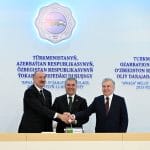Turkish exporters of energy-intensive products such as cement, steel and aluminium could face steep additional costs when legislative proposals tabled by the EU Green Deal come into effect, a new study by the European Bank for Reconstruction and Development (EBRD) shows.
The EBRD said on July 29 that the study found that businesses could be paying extra charges of €777 million, but that these would decrease to €399 million if only direct emissions are considered.
The analysis also warns Turkish companies that to access financing, climate consideration and, in particular, climate risk management will be increasingly important. This is also because of plans by the EU and the G7 to make requirements of the Taskforce on Climate-Related Risk Disclosures mandatory. One such climate transition risk is carbon pricing, and financiers will want to know how corporates are managing these. Carbon markets across the world are growing, and carbon prices, which have more than doubled to €52 a tonne in the EU ETS this year, are placing increasing pressure on emitters to decarbonise.
“The EBRD is working on a set of strategic policy choices for the government to mitigate trade risks and foster domestic low-carbon economic development in line with the EU climate policy objectives,” EBRD Deputy Head of Turkey Sule Kilic said.
The European Commission’s Carbon Border Adjustment Mechanism (CBAM) is a price on imports proportionate to the carbon content of goods imported from countries without adequate carbon pricing in order to guard against carbon leakage. The mechanism will be phased in gradually and will initially apply only to a selected number of goods. A reporting system will apply as from 2023 and importers will start paying a financial adjustment in 2026.
The charge levied at the border is meant to encourage EU trading partners to adopt carbon-pricing systems comparable to the EU Emissions Trading System (ETS) to accelerate decarbonisation in line with the Paris Agreement, the EBRD explained, adding that for non-EU countries with a high percentage of energy-intensive exports to the European Union, this new mechanism is expected to lead to steep adjustment costs.
The EBRD is actively supporting Turkey, one of the largest economies where the Bank invests and a close EU trading partner, to adapt to the coming changes. The study was commissioned as part of this effort.
While uncertainties remain as to how far down the value chain product coverage would go, the assessment finds that CBAM payments can represent a significant share of current prices for some products, for instance up to about 50 per cent for cement, 18 per cent for aluminium and 9 per cent for steel. In total, CBAM payments would represent 0.07 per cent of Turkey’s GDP forecast in 2023, provided the EC proposal enters into force at the beginning of that year.
In addition to delivering cost estimates the study analyses ways to adjust to the coming changes and their medium- and long-term implications.
Turkey already has a measurement, reporting and verification system that is similar to the EU ETS. According to the study, to meet and enhance its climate targets, Turkey could consider taking steps towards ratifying the Paris Agreement, set sectoral and national net-zero carbon targets and introduce a national emissions trading scheme. This would put the Turkish economy on an equal footing with similar developments in other OECD countries.







